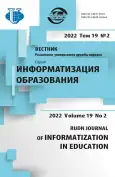Application of situative vocabulary and linguistic quasi-corpus for language acquisition
- Authors: Lvova O.V.1
-
Affiliations:
- Moscow City University
- Issue: Vol 19, No 2 (2022)
- Pages: 90-96
- Section: CURRICULUM DEVELOPMENT AND COURSE DESIGN
- URL: https://journal-vniispk.ru/2312-8631/article/view/321310
- DOI: https://doi.org/10.22363/2312-8631-2022-19-2-90-96
- ID: 321310
Cite item
Full Text
Abstract
Problem and goal. Application and integration of ICT-technologies into different human activities and fields of knowledge appeared to be rather fruitful and very promising for further improvement of existing and development of new tools. In particular, it equipped linguistics with very powerful and perspective innovative original tool - linguistic corpus, and opens new horizons for teachers in dealing with actual learning and educational tasks and responds to the challenges of modern life. Two ICT-linguistic tools - situative vocabulary and linguistic quasi-corpus were developed using the ideas of traditional topic vocabulary united with modern telecommunicative tools as blogs and chats and linguistic corpus with specific database and “human” concordance. Methodology. Potential of the tools for improvement of communicative skills in foreign language as well as in mother tongue is analyzed thoroughly and ways of their application are described. Results. Proper application of situative vocabulary and linguistic corpus for educational purposes also helps to develop multiculturalism, foster tolerance - both topics being very actual and even crucial under current circumstances and as areas for different project activities. Conclusion. Combination of ICT and linguistics allows developing modern and perspective tools shown to be effective for different learning situations.
About the authors
Olga V. Lvova
Moscow City University
Author for correspondence.
Email: LvovaOV@mgpu.ru
ORCID iD: 0000-0003-2054-8869
Candidate of Pedagogical Sciences, Assistant Professor, Department of Education Informatization
29 Sheremetyevskaya St, Moscow, 127521, Russian FederationReferences
- Jones E, Beelen J, Coelen R, de Wit H. (eds) Local and global internationalisation. Dordrecht: Sense Publishers; 2016.
- Korsakova TV, Makarova EL, Makarova EA. The role of globalization and integration in interdisciplinary research, culture and education development. Journal of History Culture and Art Research. 2019;8(1):111. http://doi.org/10.7596/taksad.v8i1.1957
- Uvarov AYu. Informatization of school: yesterday, today, tomorrow. Moscow: Binom. Laboratoriya znanii Publ.; 2013. (In Russ.)
- Kokotsaki D, Menzies V, Wiggins A. Project-based learning: a review of the literature. Improving Schools. 2016;19(3):267-277.
- Kopylovskaya MY, Lvova OV, Shkapenko TM. The magic of innovation. New techniques and technologies in teaching foreign languages (D.A. Kryachkov, E.B. Yastrebova, O.A. Kravtsova, eds.). Newcastle upon Tyne; 2015.
- Harandi SR. Effect of eLearning on student’s motivation. Procedia - Social and Beavioural Sciences. 2015;181:423-430.
- Lvova OV. New linguistic tools for social inclusion in acquisition of the foreign language. Intercultural Dialogue: Learning, Speaking, and Sharing: Proceedings of the International Seminar and Study Visit ALLMEET in Lisbon '15. Lisbon: CICS.NOVA; 2016. p. 57-60.
- Lvova OV. Application of ICT for fostering tolerance through impact on emotivity of learners. RUDN Journal of Informatization in Education. 2017;14(3):317-324.
- Shakhovsky VI. What is linguistics of emotions? Rusistika. 2008;(8):22-30. (In Russ.)
- Soldatova GU, Shaygerova LA, Sharova OD. To live in peace with yourself and others: training for teenagers. Мoscow: Genezis Publ.; 2000. (In Russ.)
- Beluce AC, Oliveira KL. Students’ motivation for learning in virtual learning environments. Paidéia (Ribeirão Preto). 2015;25(60):105-113. http://doi.org/10.1590/1982-43272560201513
Supplementary files









